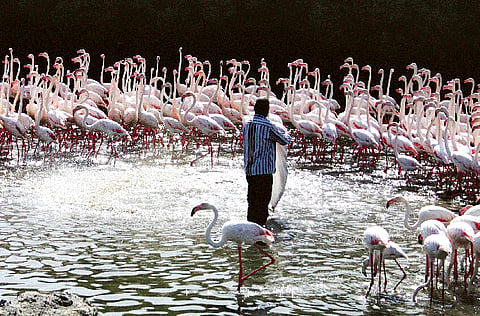Dubai's Ras Al Khor a flamingo flyway
Dubai Creek is vital to birds. Have you been to Ras Al Khor to see them?

As breeding season looms, flocks of greater flamingoes at Ras Al Khor Wildlife Sanctuary (RAKWS) are preening, plumping up their feathers and preparing for their annual migration towards their traditional breeding grounds to start the circle of life once more.
Yet during the summer months about half of these — about 1,500 — remain on the Dubai Creek’s wetlands, filtering brine through upside down bills, simply because, like many tourists, they enjoy visiting in this city of superlatives.
Visiting the sanctuary is the perfect day out for time-pressed families who can’t fly away to cooler climes themselves this seaon.
While content, the birds are not yet breeding here — despite attempts by the Dubai Municipality and the Wildlife Protection Office (WPO) to encourage them to do so.
It could still happen in time, says Kevin Hyland, Ecologist, Wildlife Protection Office. “We need to give them more peace and quiet — eliminate building disruption, crews of workers in brightly coloured jackets, JCBs and survey teams,” he says. “Ras Al Khor being recognised by Ramsar Convention as a wetland of international importance is fantastic, which empowers us to give these and other migratory birds safe passage.”
The Ramsar Convention, signed by the UAE in 2007, is a global intergovernmental treaty that lays out strategy for the conservation and sensible use of wetlands all over the world. “It is up to us in the UAE to do more to protect these birds. Ras Al Khor is a wintering and refuelling post for many migrating species of birds on the invisible East Asia/East Africa flyway. Its protection is of great importance for the survival of many,” says Hyland.
Public facilities
Hyland believes the best way to ensure RAKWS remains protected is to allow the public to understand its importance. He suggests a carefully managed visitor centre along the lines of the London Wetland Centre.
At present, Ras Al Khor is home to 270 bird species and other forms of wildlife.It also boasts various ecosystems from mangroves, mudflats, lagoons and sabkhas to reed beds and shrub lands.
All this can typically be viewed from one of two hides. Flamingo hide, off Oud Metha, and Mangrove hide, off Ras Al Khor Road, are open from 9am to 4pm for individuals or family groups, but larger groups need to apply for an entry permit on the Dubai Municipality website.
The website also indicates that future plans include building a state-of-the-art visitor’s centre. On completion, this technologically advanced centre will easily let visitors access information and offer a closer understanding of the sanctuary’s biological diversity.
For families looking for cooler, shorter trip, the Roads and Transport Authority offers a waterbus round trip from Dubai Festival City marina every day, which can be booked at the mall.
Breeding grounds
Dr Reza Khan, Specialist, Wildlife and Zoo Management, Public Parks and Horticulture Department, Dubai Municipality, says after the stopover in Dubai some flamingoes return to where they came from — Lake Urmia (formerly Lake Rezaiyeh) in Iran, the Caspian Sea, coastal areas of Iran and central Asia and increasing numbers from coastal areas and islands off Abu Dhabi.
Hyland adds that regular flamingo visitors to Ras Al Khor included those from the Gediz Delta of the eastern Mediterranean.
Relatively few breeding sites exist worldwide. If flamingoes could be encouraged to breed in this 620-hectare sanctuary of intertidal mud flats and lagoons fringed by mangroves, the birds would have an alternative to a major breeding ground in Iran. Conditions at Lake Urmia are deteriorating rapidly as the lake’s salinity has increased, mainly due to a water shortage caused by drought and human overuse.
Dr Khan says His Highness Shaikh Mohammad Bin Rashid Al Maktoum, Vice-President and Prime Minister of the UAE and Ruler of Dubai’s office and Dubai Municipality vis-à-vis the members of the Ras Al Khor Wildlife Sanctuary Management Committee are striving to improve the habitats and birdwatching facilities to attract more birds and visitors.
The most immediate need is for simple habitat enhancement schemes, such as returning dredged fill back into the water to allow more waders access.
But as long as the UAE’s residents demonstrate their interest in the country’s wildlife, the centre will benefit. Do you need another reason to visit?
More information is available at wildlife.ae ■



